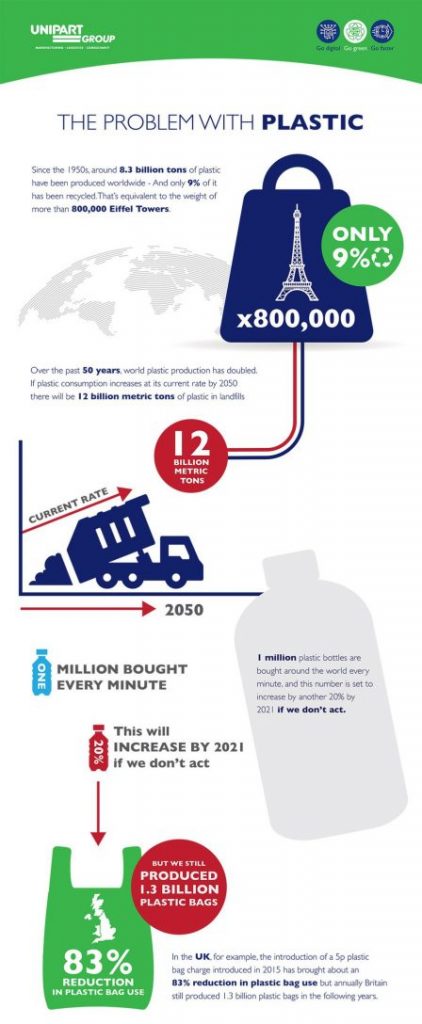 Unipart Logistics is continuing to work with clients and suppliers to eliminate single-use plastic throughout its supply chain. We are also working with customers to find innovative and sustainable packaging solutions to reduce plastic in their operations too.
Unipart Logistics is continuing to work with clients and suppliers to eliminate single-use plastic throughout its supply chain. We are also working with customers to find innovative and sustainable packaging solutions to reduce plastic in their operations too.
In 2018, we started work with Sky to remove all of their single-use plastic by the end of 2021. At that time, around 127 tons of single-use plastic left our warehouses each year, but with tremendous engagement from our pickers and packers we helped Sky remove all of its plastic way ahead of schedule, a phenomenal achievement. Our commitment, enthusiasm and belief in this cause shows it’s possible to provide intelligent logistics solutions that are not reliant on single-use plastic in a cost-effective way.
The journey began by asking a few simple questions: Why is plastic being used? Is it necessary? And what are the alternatives? We changed the way mail went out to customers, swapping plastic for paper mailing or recyclable bags. Packaging tape was also replaced by a plastic free alternative. The biggest challenge centred around pallet wrap, a type of plastic film to secure products for transportation, which can account for a large proportion of the plastic across many operations. Reusable innovations such as pallet straps and paper pallet strappings proved hugely successful in reducing plastic, whilst further stabilising and protecting products.
Now, all products coming into us do so with zero plastic and the cardboard used in processes can be made into our own boxes – completing the circle of reusing and revaluing. What used to be considered waste is now regarded as an asset and this mindset is helping us to make important changes at source and influence those we work with up and down stream.
A leading automotive partner used to plastic shrink wrap 95% of its outgoing goods, but by facilitating a switch to Velcro straps for larger products we helped reduce outbound wrap by 20% almost immediately. We then looked at the wrap itself, halving the thickness without losing effectiveness. In 2019, this contract produced 18 tonnes of plastic but by 2020 that figure had reduced to just two tonnes.
We are currently looking into ways to make further savings by trialing a shroud that could completely eliminate all of the customer’s outbound plastic wrap.
It can take a lot of ingenuity to reduce the amount of material in a pack by just one gram but the returns on investments and efforts are worthwhile when our innovations cut waste and are environmentally and financially attractive to customers.
This is the second in a series of articles, providing more insight into our work and commitment to sustainability and circular economic principles and follows on from; Circular Economy Part 1: How today’s products are the resources of tomorrow.
